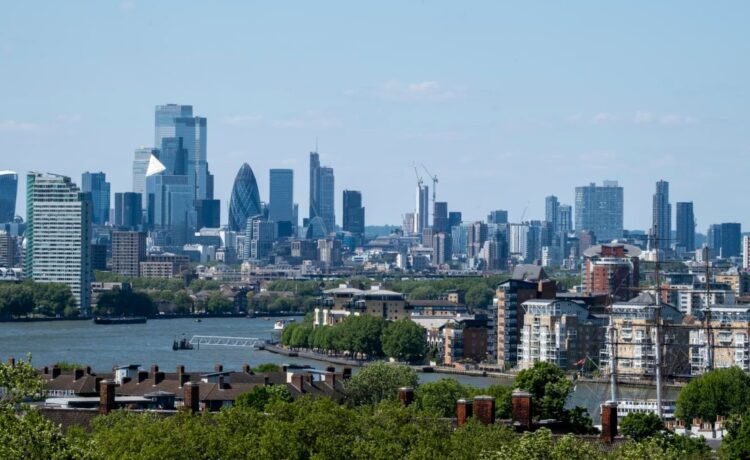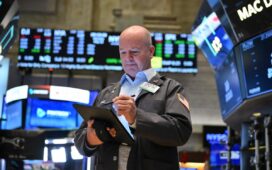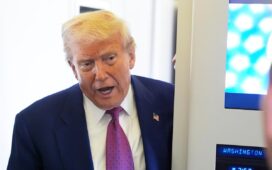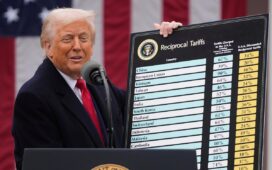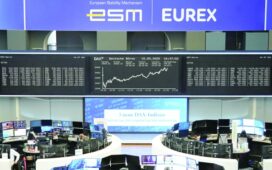This was CNBC’s live blog covering European markets and business news.
European stock markets closed lower on Wednesday
Closing out the day in markets, the pan-European Stoxx 600 index ended 0.24% lower to snap a four-session winning run that has put it comfortably above its level in early April when U.S. tariffs were announced.
Despite nudging into the green at some points on Wednesday, the U.K.’s FTSE 100 closed 0.2% lower, while Germany’s DAX and France’s CAC 40 were both down 0.47%.
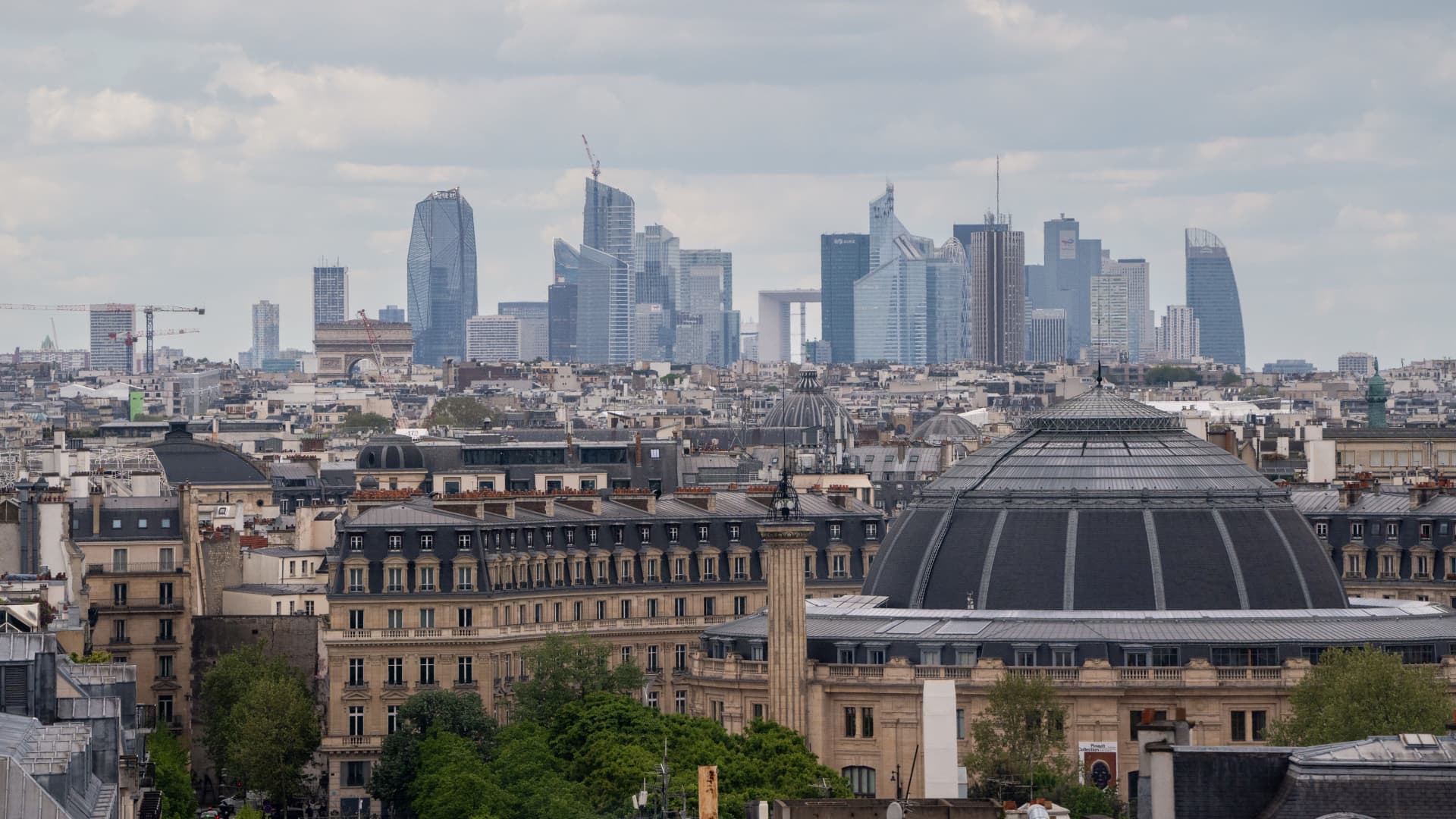
The La Defence business district in Paris, France.
Among the biggest stock movers were British luxury stalwart Burberry, which added 17% in its best session for six months after announcing cost cuts and a turnaround plan. French train manufacturer Alstom meanwhile plunged 17% following publication of its full-year results.
In wider business news, Swiss drugmaker Roche said its $50 billion investment in the U.S. was at risk from a pharmaceutical pricing order, the head of German defense giant Renk told CNBC that next month’s NATO summit would be key to the sector outlook, and video game developer Ubisoft issued an update on a deal to spin out its three most popular video game franchises into a new Tencent-backed subsidiary.
CNBC also spoke to Bank of England policymaker Catherine Mann, who said concerns about household inflation expectations led her to vote for an interest rate hold in May.
That’s all from the markets team today. On Thursday we’ll be watching U.K. economic growth data, U.S. President Donald Trump’s Middle East tour, and earnings from companies including Chinese retailer Alibaba and Germany’s Siemens. Catch CNBC’s interview with Siemens CEO Roland Busch from 6:45 a.m. U.K. time on “Europe Early Edition.”
— Jenni Reid
Ubisoft sees Tencent deal closing by end of year
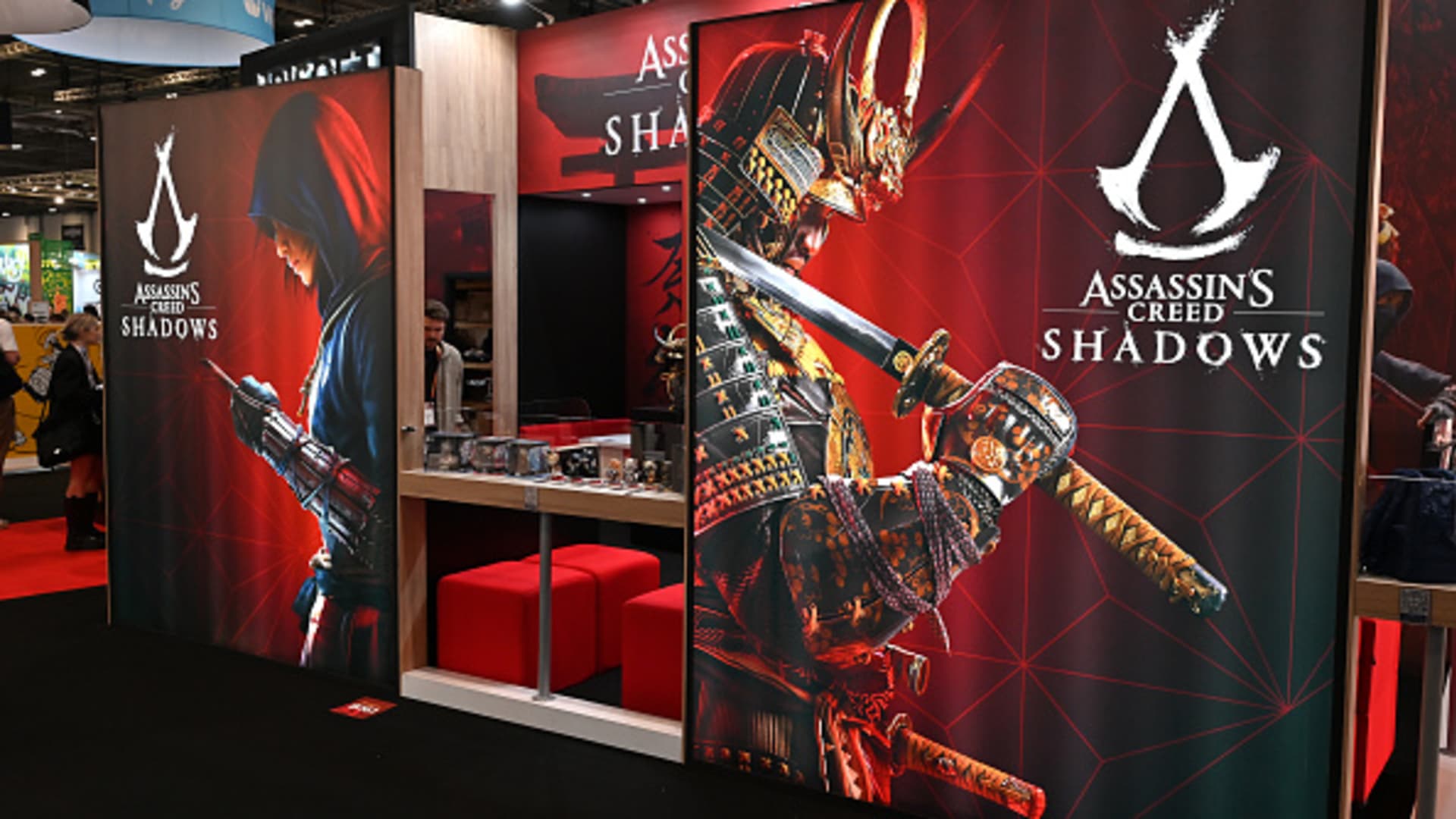
Artwork for Ubisoft’s upcoming “Assassin’s Creed Shadows” game.
French video game developer Ubisoft said it expects a deal to spin out its three most popular video game franchises into a new Tencent-backed subsidiary, will close by the end of 2025.
“The fairness opinion issued by the independent expert Finexsi concluded that the transaction is fair from a financial standpoint for Ubisoft shareholders,” Ubisoft said in its full-year earnings release Wednesday
Ubisoft is best-known as the creator of the popular “Assassin’s Creed” franchise.
In March, the company revealed plans to form a new gaming subsidiary part-owned by Chinese technology giant Tencent. Tencent will invest 1.16 billion euros ($1.25 billion) into the new unit, giving it a 25% stake with Ubisoft retaining majority ownership.
Ubisoft’s net bookings for the fiscal year ending March 31, 2025 came in at 1.85 billion euros, down 20.5% year-over-year and below its target. The firm cited “lower than expected partnerships” for the dismal sales performance. Ubisoft also reported an operating loss of 15.1 million euros.
— Ryan Browne
Euro higher against dollar and sterling
The euro was 0.2% higher against the U.S. dollar at 4:10 p.m. in London, and up 0.3% against the British pound.
The greenback has seen swings over recent weeks as markets digest news trade and tariff updates, including the pause on the highest level of U.S.-China tariffs, which initial drove a sharp gain.
“There are likely lingering concerns that positive trade-related news may soon be outshadowed by hard evidence of the damage already done to the US economy, and there may not be enough incentive to chase dollar rebounds until clarity on the impact of tariffs has emerged,” ING strategists said Wednesday.
— Jenni Reid
Swiss pharma giant Roche says Trump drug pricing order threatens its $50 billion U.S. investment
Swiss healthcare giant Roche has warned that U.S. President Donald Trump’s recently-announced executive order on pharmaceutical pricing could prevent it upping its investments stateside.
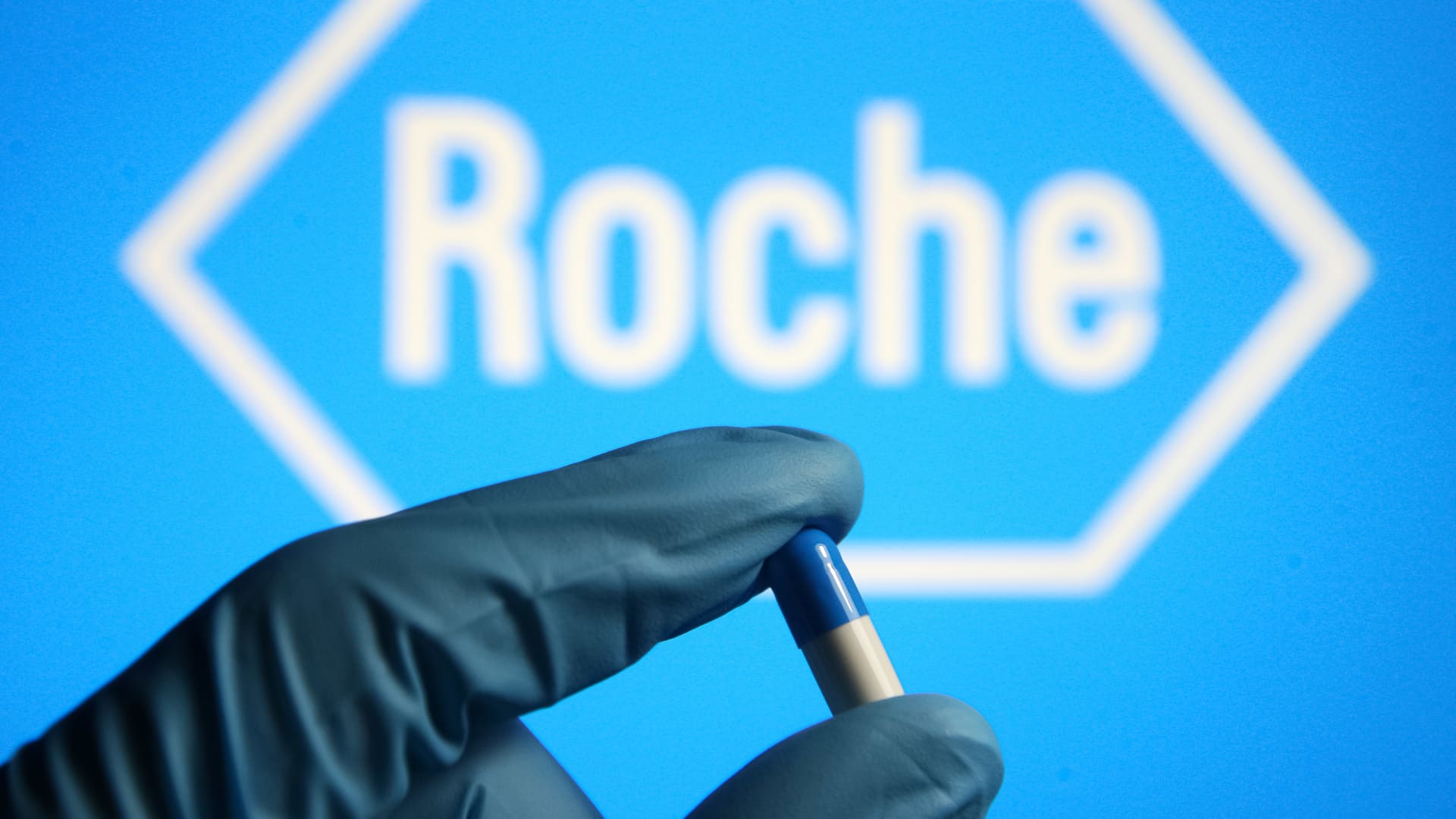
Trump on Monday revived a controversial policy that aims to slash drug costs by tying the prices of some medicine in the U.S. to the significantly lower ones abroad.
“Should the proposed Executive Order go into effect, Roche’s ability to fund the significant investments previously announced in the US will be in question,” the company told CNBC in a statement.
Roche last month said it would invest $50 billion in the U.S. over the next five years, including in new research and development sites and manufacturing facilities, creating an estimated 12,000 jobs.
“Overall, we are concerned that the Executive Order will undermine the US’s position as the world’s leading pharmaceutical and healthcare ecosystem, as well as dampen economic growth and lead to job losses in the US,” Roche said in the statement.
“The Order’s proposed “Foreign First Principle” would lead to cuts on hundreds of billions of future US pharmaceutical R&D and manufacturing investments while not addressing significant market distortions whereby half of every US dollar spent on medicines goes to insurers, hospitals and pharma benefit managers.”
The statement comes with uncertainty over U.S. tariffs on imported medicines hanging over the industry.
— Karen Gilchrist, Jenni Reid
U.S. stocks open higher
Over on Wall Street, U.S. stock markets have nudged higher at the open, with the S&P 500 and Dow Jones Industrial Average both up around 0.2% and the tech-focused Nasdaq Composite up 0.5%.
The moves reflect increased risk appetite after the U.S. and China temporarily slashed tariffs on a wide array of goods.
The S&P 500 has now regained losses from April’s tariff-sparked market turmoil, which at one point saw the index down more than 20% from its all-time high in February, and ongoing U.S. trade talks are seen as crucial to maintaining sentiment.
— Jenni Reid
Inside Trump’s Saudi speech as Middle East tour continues
European markets are downbeat in mid-afternoon trade with earnings in focus, while on the world stage, eyes remain on U.S. President Donald Trump’s Middle East tour.
Tuesday saw the U.S. leader deliver an address at the Ritz Carlton Riyadh in Saudi Arabia, where he heaped praise on the kingdom and outlined U.S. relations with the region to a packed room. CNBC’s Natasha Turak reports on the mood inside the plenary here.
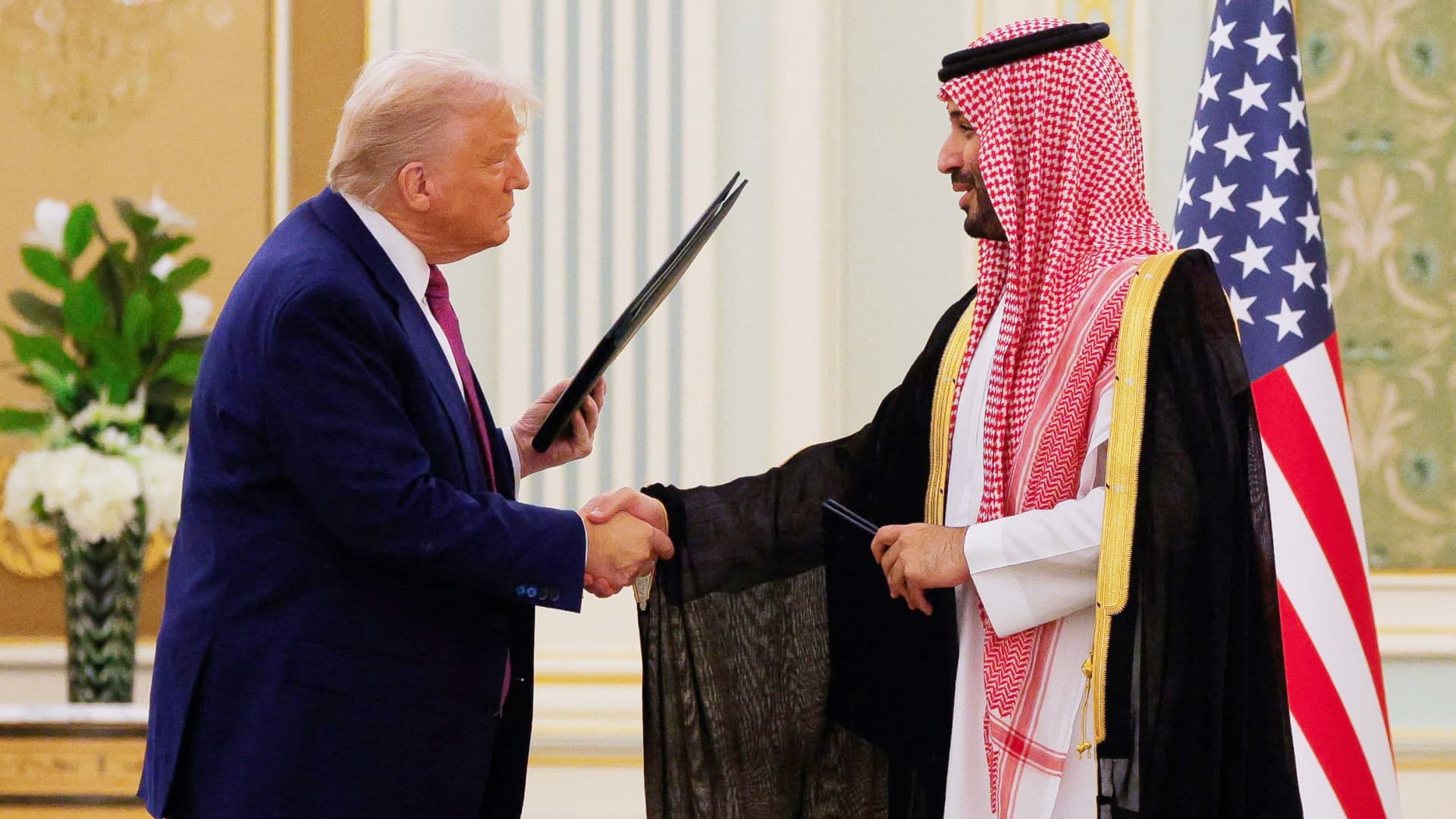
U.S. President Donald Trump and Saudi Crown Prince and Prime Minister Mohammed bin Salman shake hands during a Memorandum of Understanding signing ceremony at the Royal Court in Riyadh, Saudi Arabia, on May 13, 2025.
The trip has already yielded a pledge of a $600 billion U.S. investment in Saudi Arabia and an announcement of the lifting of U.S. sanctions on Syria.
Trump meanwhile generated criticism for his willingness to potentially accept a $400 million luxury jet from Qatar — an offer still under discussion and not due to be made this week. He landed in the Qatari capital Doha on Wednesday.
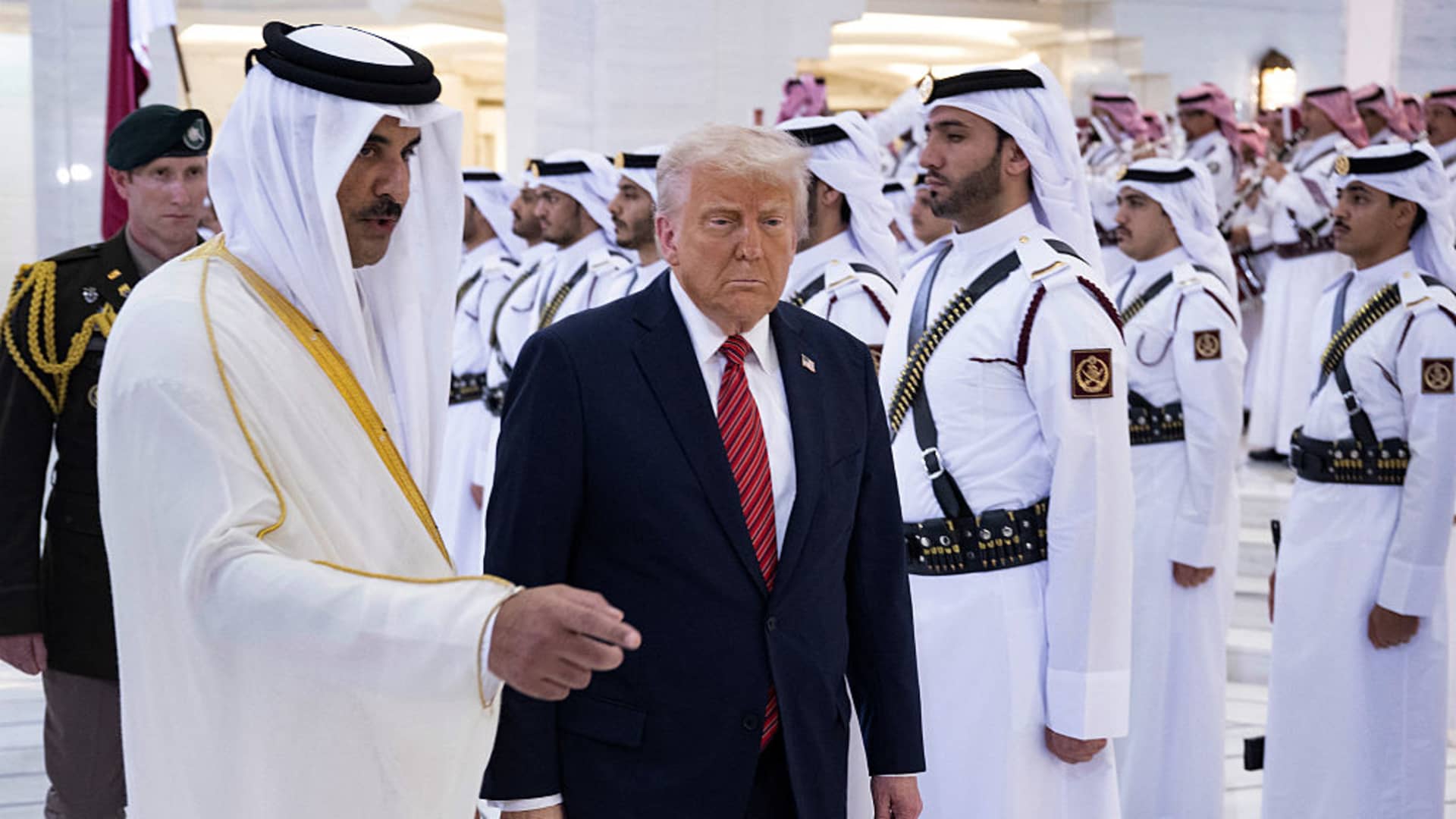
Qatar’s Emir Sheikh Tamim bin Hamad al-Thani (L) receives US President Donald Trump in the Qatari capital Doha on May 14, 2025.
— Jenni Reid
Novo Nordisk strikes $2.2 billion obesity drug deal
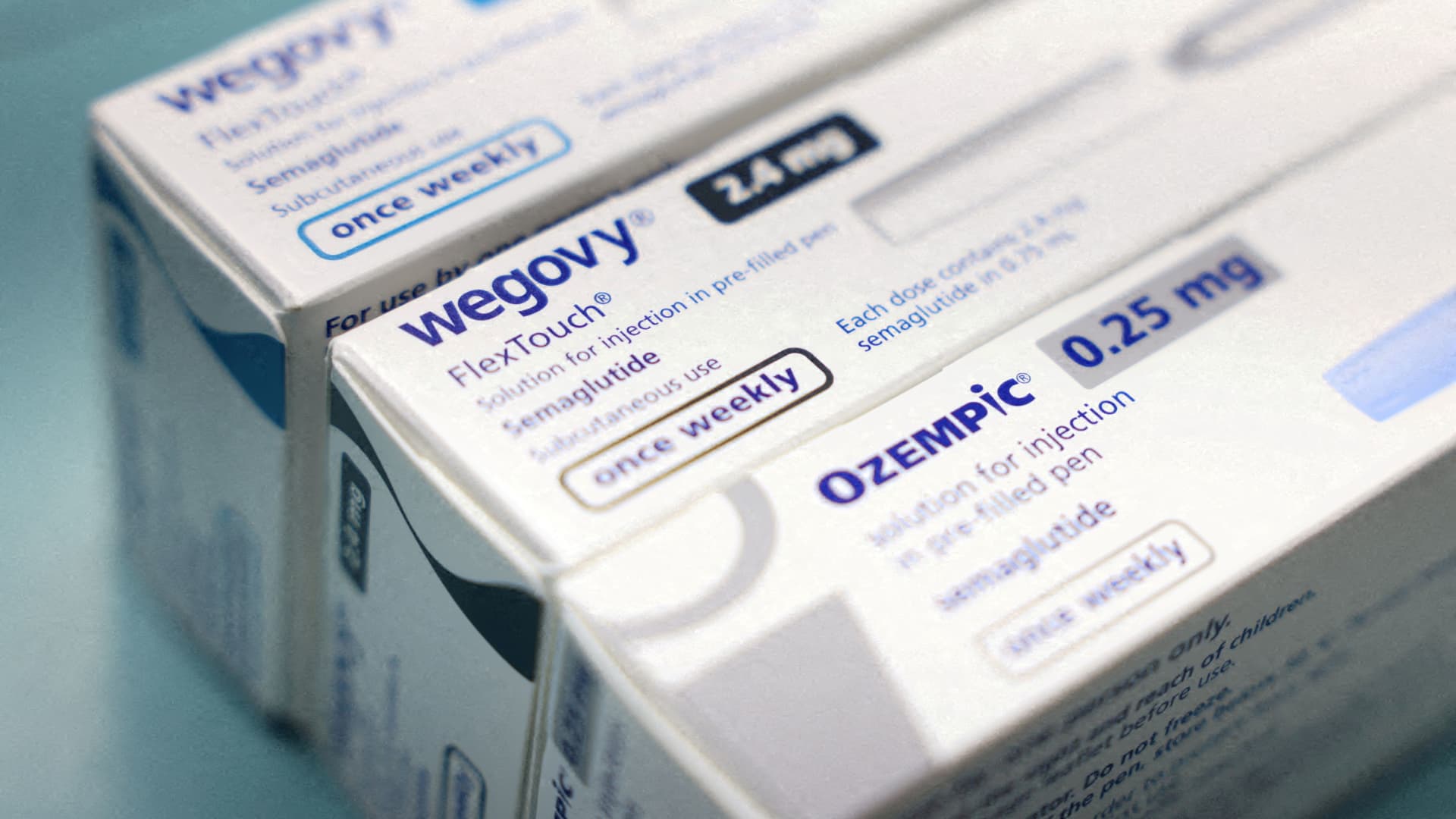
Boxes of Ozempic and Wegovy made by Novo Nordisk are seen at a pharmacy.
Novo Nordisk said it has struck an exclusive collaboration and licensing deal with U.S. biotech Septerna to “discover, develop and commercialize” oral small molecule medicines for obesity, type 2 diabetes and other cardiometabolic diseases.
The Wegovy maker said it will initially commence four development programs as it seeks to diversify and cement its position in the ballooning obesity drug maker.
“We are building on our scientific leadership in this space and developing a broad pipeline across various targets and modalities, including peptides and small molecules,” said Marcus Schindler, executive vice president and chief scientific officer of Novo Nordisk.
— Karen Gilchrist
European stocks trade slightly lower
Hello from the markets team in sunny London. It’s been a mixed morning for European equities, with the regional Stoxx 600 mainly trading lower and hovering just below the flatline in the early afternoon — threatening a four-session run in the green.
Luxury stock Burberry topped the index, up nearly 15%, after publishing an ambitious cost-cutting and turnaround plan, though analysts warn it will take time to bear fruit. At the other end of the spectrum, French train-maker Alstom tumbled 17% despite its return to positive free cash flow.
We’ve also been monitoring a jump in orders at German defense manufacturer Renk, whose CEO told CNBC he’s awaiting a flurry of spending commitments from governments at June’s NATO Summit. Shares were last down 0.8%.
Bank of England rate-setter Catherine Mann explained to CNBC’s “Squawk Box Europe” why she is worried about an increase in U.K. household inflation expectations, leading her to vote for an interest rate hold at the May meeting.
— Jenni Reid
Train-maker Alstom tumbles 17%

The new TGV INOUI train leaving a technical centre of French national rail company SNCF ahead of it’s unvailing, in Paris, on March 10, 2025. The train manufactured by French rolling stock manufacturer Alstom will enter into service at the beginning of 2026.
Shares of French train manufacturer Alstom plunged 17%, putting it at the bottom of the Stoxx 600 index by midday in London, as investors parsed its full-year results.
Sales rose 6.6% year-on-year to 18.5 billion euros ($20.8 billion) on an organic basis, with the growth rate forecast to cool to between 3% and 5% in the coming fiscal year.
The adjusted earnings before interest and tax (EBIT) margin increased to 6.4% from 5.7% while free cash flow (FCF), a longstanding issue for the firm, came in at 502 million euros, slightly ahead of both guidance and market expectations.
“While we see order levels down [year-on-year], we expect commentary on the pipeline to remain robust,” Citi analysts said in a note.
“We recently downgraded our rating to neutral, and see the larger catalyst event to be when the current planning horizon completes in [full year] 27, with the potential for higher margins and further improved FCF conversion beyond that point.”
— Jenni Reid
Analysts say Burberry turnaround will take time
CNBC’s Karen Gilchrist reports that any business turnaround at Burberry — which is targeting cost savings of £60 million ($79.9 million) — will take time to bear fruit.
Jefferies analysts said the “brand’s turn-around case is in slow-burn mode,” with limited innovation potential as it refocuses on classic pieces like its trench coat.
Yanmei Tang, analyst at Third Bridge, noted that such an item “naturally limits the frequency of repeat purchases.”
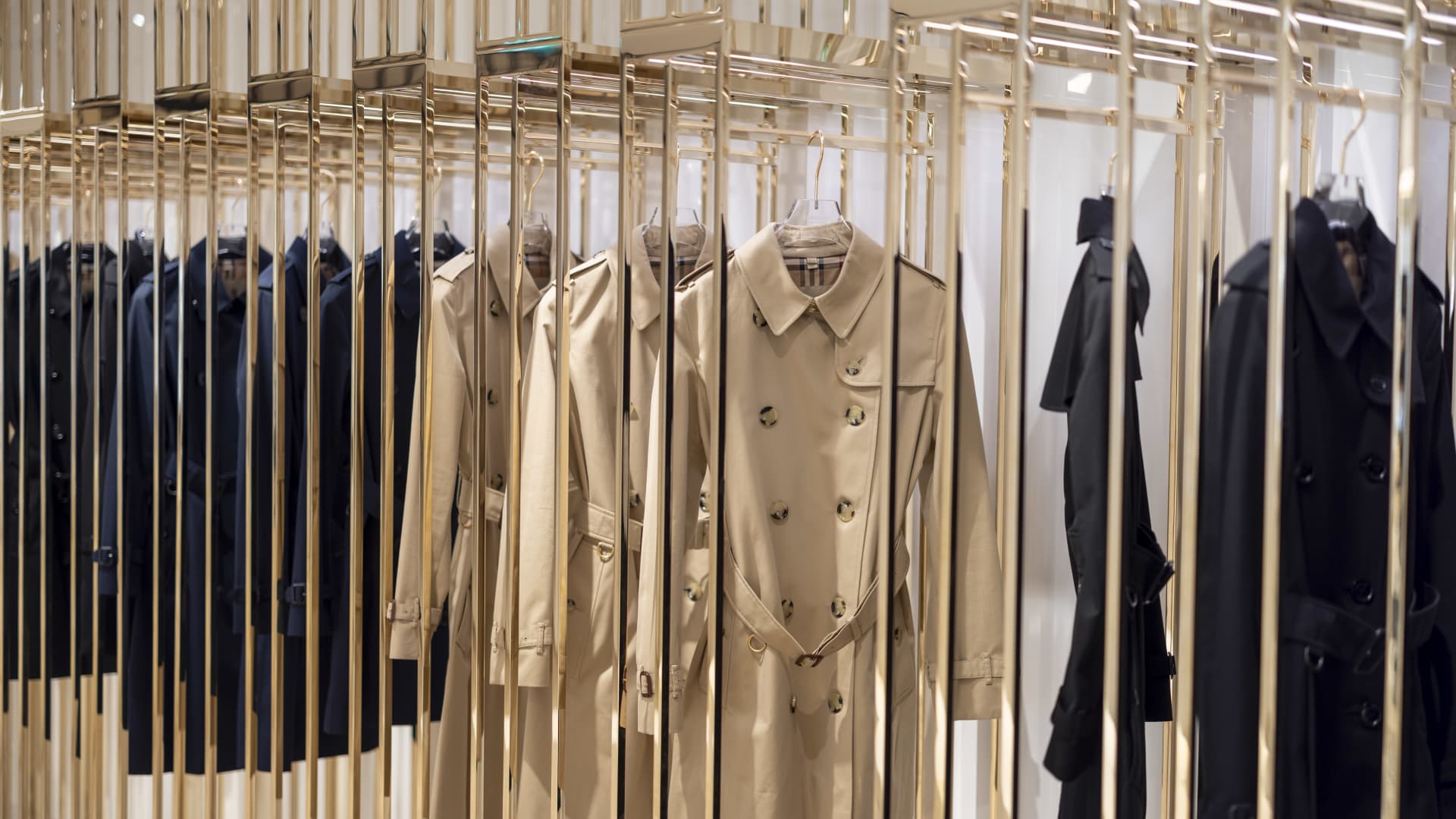
Trench coats on display in a Burberry store on Bond Street in London on Sept. 15, 2023.
Renk CEO says June NATO summit will be key for defense sector spending outlook
Alexander Sagel, head of German defense manufacturer Renk, told CNBC’s Annette Weisbach that the NATO summit due to run from the June 24 to June 25 will be key for the industry to get a firm view of government spending commitments.
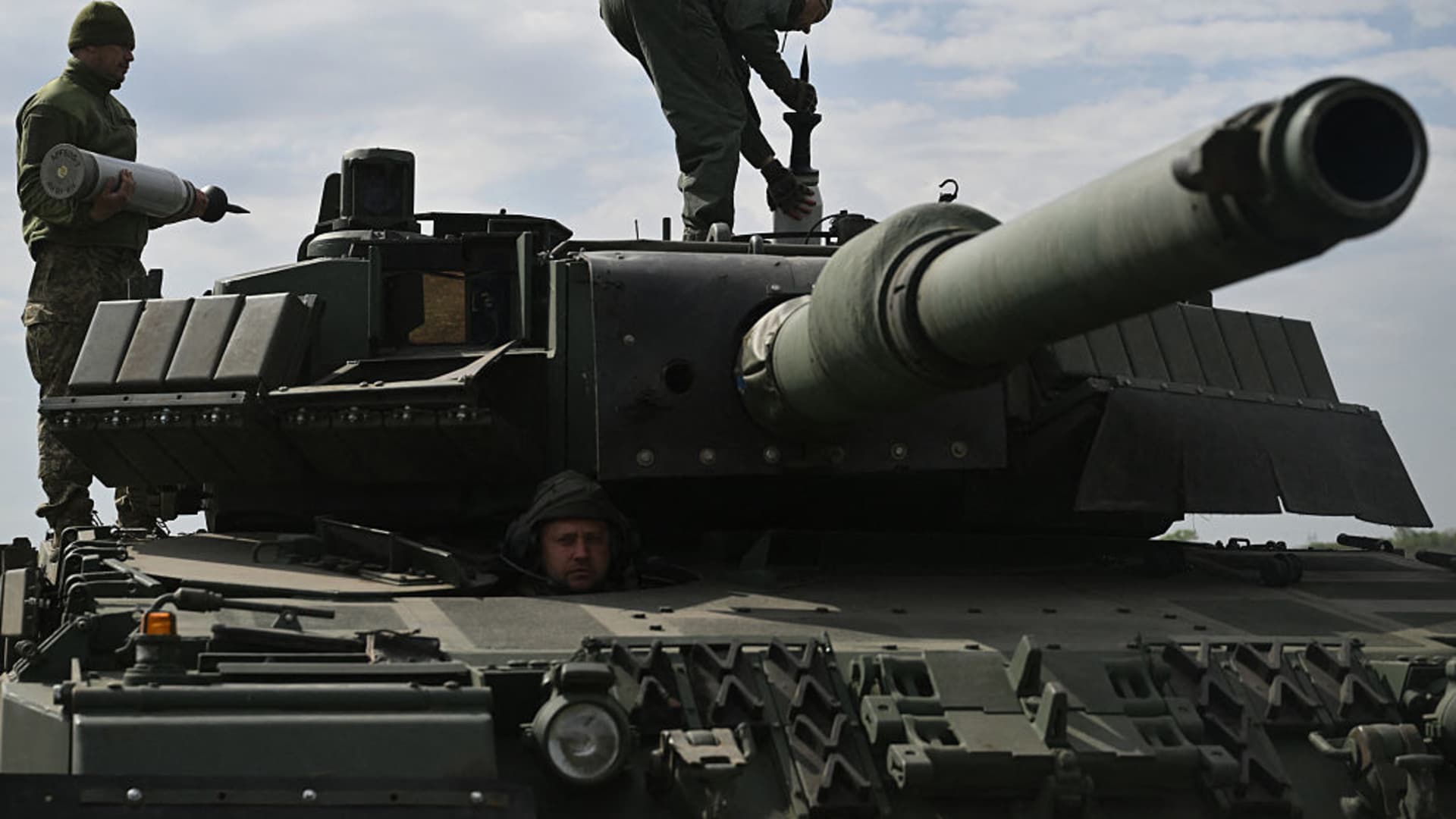
A Ukrainian tank crew of the 33rd Separate Mechanized Brigade load tank ammunition onto a Leopard 2A4 tank during a field training exercise at an undisclosed location in Ukraine, on April 30, 2025. Germany’s Renk makes gearboxes for Leopard 2 tanks which have been sent to the country.
As well as the broad announcement of higher defense targets from governments, Sagel said he expected Germany to increase its spending as a proportion of GDP to 3% or 3.5%, from current levels near 2%.
“I think also what we will get from the NATO summit are clear, key requirements to each of the European NATO users. So what I expect to get, or what we as Germany, is a clear number of how many brigades, how many tanks, etc, etc, what kind of platforms need to be invested in the next 10 years,” he said.
In parallel, the company will be monitoring the formation of the new German government, Sagel continued, meaning “major decisions to be expected, and a more clear view on potential projects and upsides for Renk” in the third and fourth quarter.
Renk on Wednesday reported a 15% year-on-year revenue increase to 273 million euros ($306.7 million) for the first quarter, just shy of market expectations. Shares were up 0.27% at 9:45 a.m. in London.
— Jenni Reid
Wednesday news digest: Trump inks flurry of deals with KSA
- U.S. President Donald Trump hails his return to Saudi Arabia where he has secured hundreds of billions of dollars of investment from the kingdom. He will be heading to Qatar later today.
- The U.S. Agriculture Secretary, Brooke Rollins, says Trump’s global trade negotiations will be a boon to the whole world.
- German shipping giant Hapag-Lloyd confirms its full-year outlook despite trade concerns on the horizon.
- And defense firm Renk doubles its quarterly orderbook, seeing intakes of 550 million euros ($618.2 million.)
Listen below or find “Squawk Box Europe Express” wherever you get your podcasts.
European currencies rally
The euro gained 0.5% against the U.S. dollar by 9:49 a.m. in London to trade at around $1.124.
The British pound also rose against the greenback, notching a 0.3% gain, while the Swiss franc jumped around 0.4%.
It came after the U.S. posted cooler-than-expected inflation data on Tuesday, after which the dollar lost some of the ground it had gained the previous day.
— Chloe Taylor
Bank of England’s Catherine Mann on interest rates
Catherine L Mann, an external member of the Bank of England’s Monetary Policy Committee, told CNBC’s “Squawk Box Europe” on Wednesday she had advocated for a 50-basis-point cut in February as she anticipated a “non-linear change in the labor market that would be deleterious for growth and consumption.”
“And that that would lead to … reduction of pricing power of firms, and so that cascade from a very weak labor market into lower inflation was what I saw in the cards,” Mann said.
The central bank cut rates by 25 basis points in February.
Mann was then one of two members of the MPC who voted to hold rates steady at its most recent meeting last week. The central bank instead reduced its key interest rate by 25 basis points again, bringing it down to 4.25%.
“So where are we now, or where was I in the last decision? The first observation is that the labor market has been more resilient,” Mann told CNBC. “Yes, we’ve had some prints that are indicative of the slowing labor market, but it is not a non-linear adjustment. Number two, and actually much more important, our household expectations have increased both at the one-year mark and the five-year mark. I worry about that. Plus goods, price inflation has increased. PMIs for input and output prices has increased.”
“And so that cascade from labor market weakness to pricing weakness did not happen,” she added. “The market’s given me 75 basis points. I only asked for 50.”
— Chloe Taylor
CNBC’s Ganesh Rao is at the London Value Investor Conference
Good morning from the Queen Elizabeth II Centre in central London.
Stocks are on the breakfast menu this morning for the fund managers attending the London Value Investor Conference.
I’ll be bringing live updates this morning as some of the biggest investors pitch their stock ideas on stage. Simon Adler, portfolio manager of Schroders’ Global Recovery, Global Income and Global Sustainable Value strategies, is performing the opening act. Alex Roepers, chief investment officer of Atlantic Investment Management, will be pitching four stock ideas later in the day, I’m told.
And Charles Heenan, investment director at Kennox Asset Management, has traveled down from Edinburgh to present his ideas to the conference.
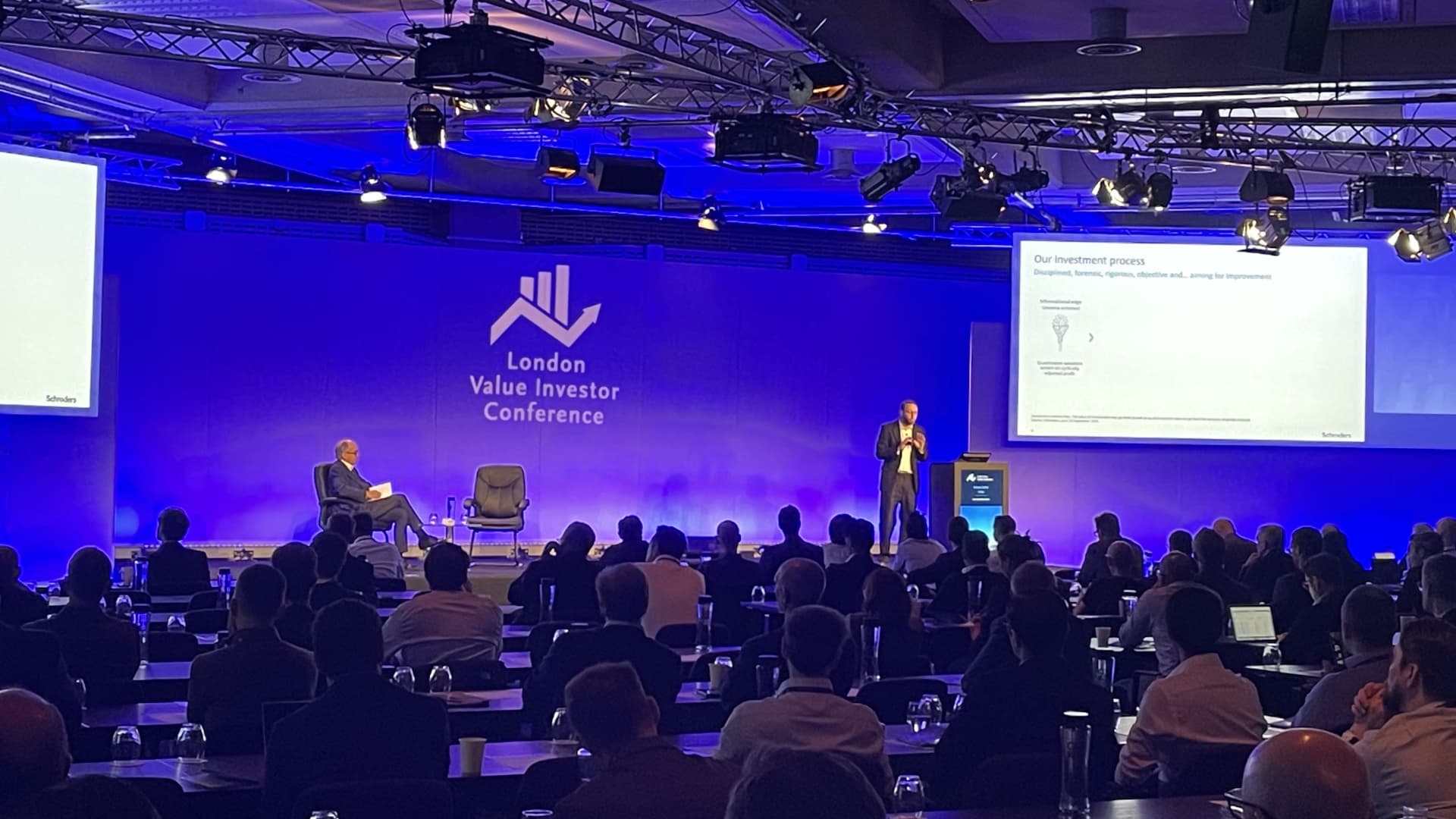
The London Value Investor Conference on May 14.
— Ganesh Rao
European stocks move lower
It is 8:41 a.m. in London, and regional stocks are slightly lower following mixed trade immediately after the opening bell.
The Stoxx Europe 600 index is down 0.1%, inching lower from a 0.1% rise. Sectors and major bourses are currently in mixed territory, with France’s CAC 40 leading losses on a drop of around 0.4%.
— Chloe Taylor
Burberry shares pop 9%
London-listed shares of Burberry were 9.1% higher at 8:27 a.m. in London, after the company announced new steps in a restructuring plan and said its earnings fell less than expected in the three months to March.
The company said its organizational changes could lead to job cuts, with the strategy potentially affecting up to 1,700 jobs globally.
Watch: Latvian foreign minister on NATO defense spending
Embattled Burberry announces new turnaround steps even as sales fall less than expected
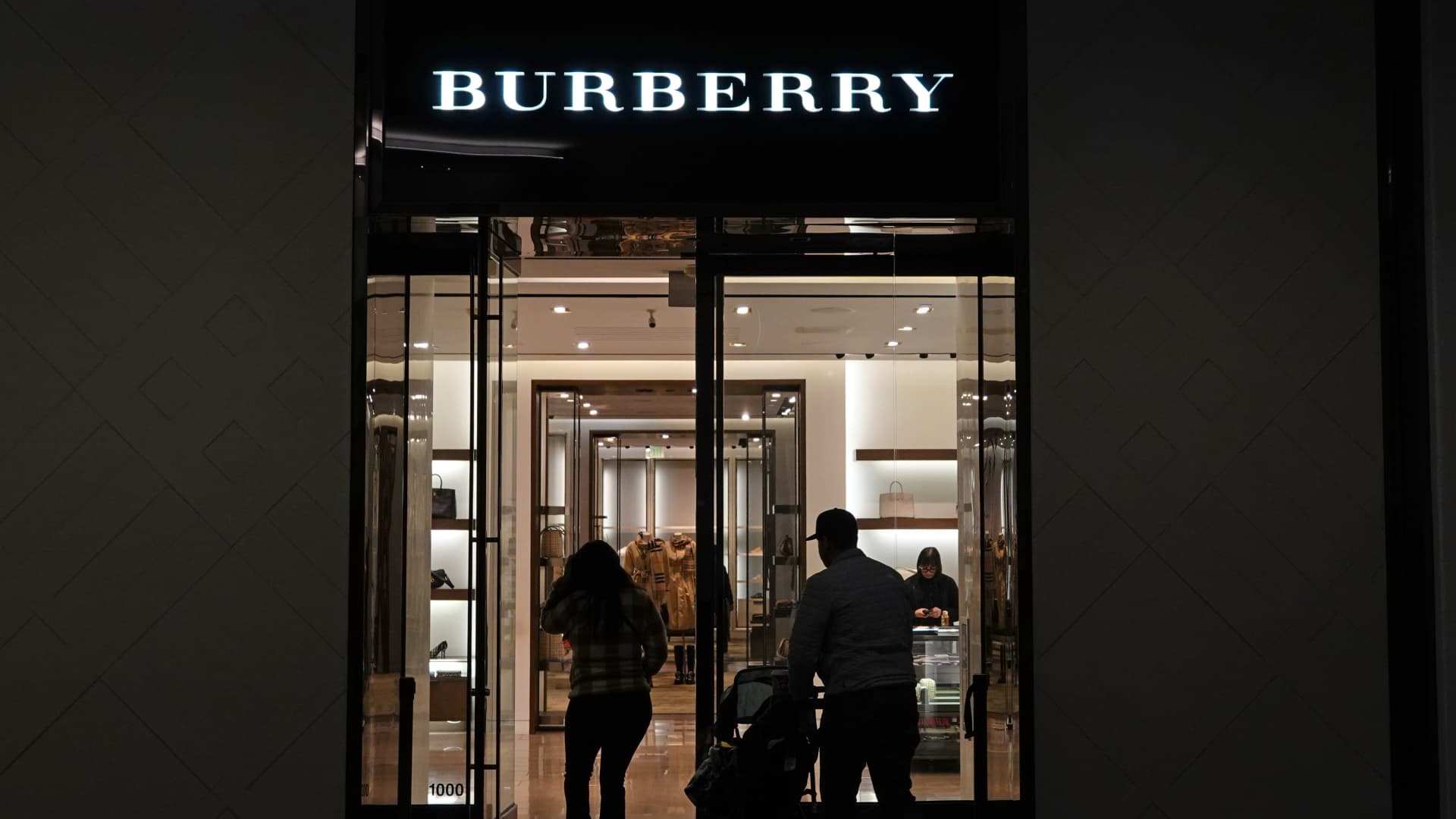
A Burberry store at Fashion Valley, an upscale shopping mall, on Dec. 13, 2024, in San Diego, California.
In corporate news, British luxury giant Burberry just announced a slew of organizational changes, as part of continued turnaround efforts at the embattled luxury house.
CNBC’s Karen Gilchrist is reporting on the measures, which were announced as the company’s quarterly earnings report showed sales fell less than expected in the three months to March.
Stoxx 600 could end four-day run of gains
If the Stoxx 600 dips into negative territory on Wednesday, it will put the index on track to snap its four-day winning streak.
Global stocks rallied earlier this week after the U.S. and China announced a 90-day pause on most of the tariffs they had slapped on each other’s goods in recent weeks. The Stoxx 600 gained 1.2% on Monday, after details on the deal were made public.
— Chloe Taylor
TUI misses sales expectations over timing of Easter holidays
Holiday operator TUI Group missed top line expectations owing to a shift in Easter holidays to the third financial quarter.
The company said revenues were “modestly” higher by 1.5% to 3.7 billion euros ($4.14 billion) for its third financial quarter ending March 31, missing analyst expectations of 3.86 billion euros. It also reported an adjusted loss of 207 million euros, better than the expected 226.1 million loss.
However, TUI maintained its full-year revenue guidance, adding that total sales were expected to rise between 5% and 10%.
“We expect a small positive reaction as the strong profitability and continued [average sale price] growth for summer bookings offsets the deceleration in booking volumes – even with the Easter impact,” said Citi’s equity analyst Leo Carrington in a note to clients. “With the company reiterating its [2025 financial year] guidance, we don’t expect material changes to consensus estimates at this stage.”
— Ganesh Rao
The UK wants to crack down on foreign workers. Businesses worry Brits can’t — or won’t — fill the labor gap
CNBC’s Holly Ellyatt reported this morning that British businesses are concerned about a labor shortage arising from U.K. government plans to tighten immigration policy.
The British government on Monday announced plans to cut migration to the U.K., tightening the rules on who can come to work, study and live in the country. The proposals raise English-language requirements for migrants, as well as the skills and level of education they need to obtain work visas.
Read Holly’s story in full here.
German inflation hit 2.2% in April
Germany’s annual harmonized inflation rate stood at 2.2% in April, data from the country’s Federal Statistical Office showed on Wednesday.
The data release confirmed preliminary figures released at the end of last month.
— Chloe Taylor
Opening calls
Good morning from London.
European stock markets are expected to open lower, paring some of the gains seen earlier this week after the U.S. and China agreed to a trade truce.
Futures point to the Stoxx Europe 600, Germany’s DAX and the French CAC 40 all opening 0.2% lower, while the FTSE 100 is slated to shed 0.3%.
Investors are looking ahead to earnings updates from Burberry, TUI, Imperial Brands, Experian, Compass Group, Telefonica and EON.
— Chloe Taylor

